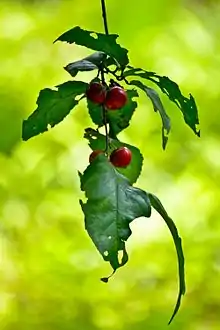Flacourtia inermis
Flacourtia inermis, known commonly as lovi-lovi, or batoko plum, is a species of flowering plant native to the Philippines and Indonesia, but which has naturalized around the edges of tropical Asia and Africa.[1] Common names in Indonesia include Tome-Tome (Ternate, North Maluku), Lovi-lovi, and lobi-lobi.
| Flacourtia inermis | |
|---|---|
 | |
| Scientific classification | |
| Kingdom: | Plantae |
| Clade: | Tracheophytes |
| Clade: | Angiosperms |
| Clade: | Eudicots |
| Clade: | Rosids |
| Order: | Malpighiales |
| Family: | Salicaceae |
| Genus: | Flacourtia |
| Species: | F. inermis |
| Binomial name | |
| Flacourtia inermis (Burm. f.) Merr. | |
Description
It is a medium-sized spineless tree that may grow up to 15 metres (49 feet). The mature leaves are oblong and elliptic in shape and glossy on the upper side, with a toothed margin. They are about 8 to 20 centimetres (3 to 8 inches) long and 3 to 15 cm (1 to 6 in) wide. The young leaves are bright orange to reddish in color, turning green as they mature.
The fruits are produced in bunches and resemble cherries. The fruit is round and shiny, turning from light green to a deep red colour upon ripening. Each fruit measures 1 to 3 cm (1⁄2 to 1+1⁄4 in) in diameter. The flesh is crunchy but sour and acidic in taste. Its fruit is rich in an antimicrobial agent-2,3-Dihydroxybenzoic acid.[2][3][4][5][6]
Related species
The family Salicaceae includes well-known species such as kei apple (Dovyalis caffra), paniala (F. jangomas), and rukam (F. rukam).
Uses
The fruits are edible raw or cooked but usually not eaten fresh, instead being used in jams, preserves, and syrups.[5][1][6]
References
- The Complete Guide to Edible Wild Plants. United States Department of the Army. New York: Skyhorse Publishing. 2009. p. 27. ISBN 978-1-60239-692-0. OCLC 277203364.
{{cite book}}: CS1 maint: others (link) - Shibumon George, Benny PJ, Sunny Kuriakose, Cincy George (2011) "Antibiotic activity of 2, 3-dihydroxybenzoic acid isolated from Flacourtia inermis fruit against multidrug resistant bacteria" Asian Journal of Pharmaceutical and Clinical Research.4(1):126-130.
- George Shibumon, Benny PJ, Kuriakose Sunny, George Cincy, Gopalakrishnan Sarala (2011) "Antiprotozoal activity of 2, 3-dihydroxybenzoic acid isolated from the fruit extracts of Flacourtia inermis Roxb" Medicinal Plants - International Journal of Phytomedicines and Related Industries.3(3):237- 241.
- Benny PJ, George Shibumon, Kuriakose Sunny, George Cincy (2010) "2, 3-Dihydroxybenzoic Acid: An Effective Antifungal Agent Isolated from Flacourtia inermis Fruit" International Journal of Pharmaceutical and Clinical Research.2(3): 101-105
- Flacourtia inermis
- Louvi